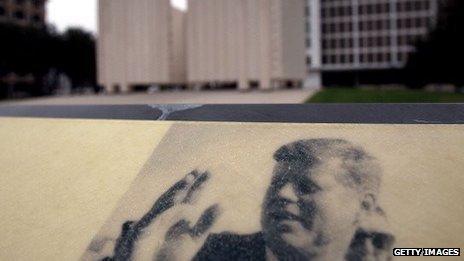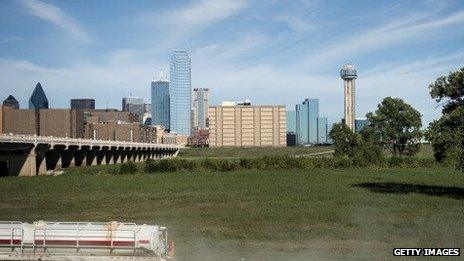Did Dallas kill JFK?
- Published
- comments

A New York Times opinion piece, external contends that Dallas has failed to face its role in the murder of John F Kennedy 50 years ago this month. Residents of the Texas city, and conservative commentators, are crying foul.
"For the self-styled 'Big D', grappling with the assassination means reckoning with its own legacy as the 'city of hate', the city that willed the death of the president," writes James McCauly, a native Texan who is currently studying at Oxford University, in Sunday's New York Times. "It will miss yet another opportunity this year."
McCauly notes that his own grandparents were conservative Dallas extremists with a fixation on "liberalism, gender equity, gays". They considered Kennedy an "enemy of the state". Their vitriol created a toxic political environment in the city, he writes, that has left Dallas residents feeling a "collective culpability" for the president's death.
I spoke with Dallas Morning News Assistant Editorial Page Editor Nicole Stockdale, and she said that she and her coworkers read the Times column and were "aghast".
"This piece minimized the introspection that's really occurring in Dallas right now," she said.
She said they felt obligated to publish an official editorial response, which appeared today, external.
To confront the "city of hate" moniker that was pinned to Dallas in the days after Kennedy's assassination, she noted that the city has held a symposium with speakers from across the country and a "City of Love" exhibit that features more than 15,000 citizen-created art projects. In addition, the Morning News has spent all year, external covering the anniversary of the Kennedy slaying, including examining what role the city's leaders and newspaper had in fostering a climate of intolerance.
BBC correspondent Jonny Dymond recently travelled to Dallas for a BBC Radio 4 Today story that will air on November 21. He visited Dealey Plaza, where Kennedy was shot, and spoke with Dallas residents about the assassination and how it still haunts the city.
"Everything the city is today is a direct reflection of the assassination of President Kennedy," Gail Thomas, founder of the Dallas Institute of Humanities and Culture, told him. "My sense is Dallas is just now really beginning to come into its own as a very powerful twenty-first century city because we've had this dark shadow, this mark on us."

A New York Times column on the Kennedy assassination has sparked outcry in Dallas
That dark shadow was clear to BBC reporter Peter Watson, who filed from Dallas hours after the assassination. In notes he took while covering the story, he wrote: "Inwardly there is only one word to describe the feelings of Dallas and all Texas. It is SHAME, shame not only at the crime, but shame that Texas hospitality should have been breached."
Toward the end of his piece, McCauly gets to what really is the point of his argument, and it's not that Dallas' civic leaders have failed to hold enough symposia or art exhibits. He writes that the flames of intolerance have been kept alive even in today's 6.7 million person metropolis.
The BBC's Alan Little reports on the links between JFK, Lincoln and Obama
"The far right of 1963 … may have faded in recent years, they remain very much alive in Dallas," he wrote. "Look no further than the troop of gun-rights activists who appeared just days ago, armed and silent, outside a meeting of local mothers concerned about gun violence. If this is what counts as responsible civic dialogue, then Dallas has a long way still to go."
Not surprisingly, connecting the Kennedy assassination and the radicalisation of 1963 Dallas to today's pro-gun movement has stirred a conservative, external hornets', external nest, external.
"I was under the impression that President Kennedy was assassinated by a communist named Lee Harvey Oswald; evidently, I was misinformed," writes Steve Sailer, external of the American Conservative. "Instead, it must have been a giant right-wing conspiracy."
Others were quick to read McCauly's pieces as a larger criticism of today's grass-roots conservative Tea Party movement, in which Texans and Texas politics play a prominent role.
"Dallas is now part of the largest Republican dominated state in the country," writes Doug Mataconis, external for the Outside the Beltway. "A state that has given us everyone from George W Bush to Rick Perry to Ted Cruz. So, I suspect there may be more than a little of Texas-bashing going on here."
In a segment that airs tonight on BBC's Newsnight, Allan Little traces the current divide in US politics, over individual freedom and the role of the federal government. This conflict about what it means to be an American animated the conservative activists of 1963 Dallas, formed the battles lines of the US Civil War and inspired the words of Abraham Lincoln's Gettysburg Address.
"Americans are still arguing about how to live the ideals that their republic is founded on," he says, "still bitterly divided about precisely what government of the people, by the people, for the people should mean in practice."